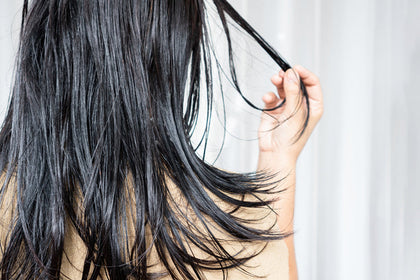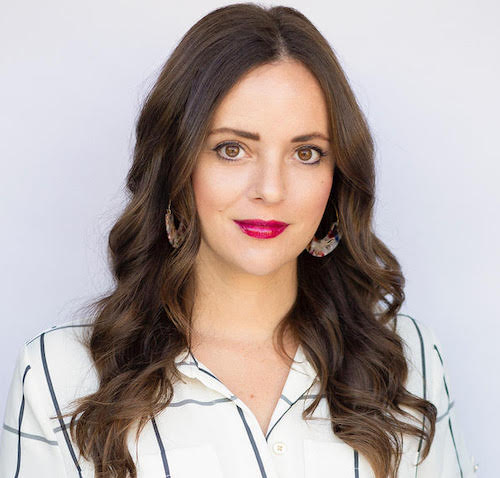Dealing with oily or greasy hair can be so frustrating, especially if you've taken the time to style your hair and you're hoping to keep it for a couple of days. Even if your hair is freshly washed, within hours it returns to its naturally greasy state.
Read on to find out more about why your hair gets oily so fast, as well as the best products for balancing your scalp's oil production naturally.
How Do I Stop My Hair From Being So Oily?
Some people might think oily hair is the same as dirty hair that's in need of a wash. The truth is that there are a variety of reasons why you might have oily hair that have nothing to do with how long it's been since your last wash day.
When your scalp produces too much sebum, it can make your hair look greasy and feel heavy. This is because sebum is an oily substance that helps to keep your hair healthy and moisturized. However, when there's too much of it, it can weigh your hair down.
While sebum is good for your scalp and hair follicles, hair expert Dr. Harikiran Chekuri explained that an excess of it makes hair oily. Certain hair types are often hit harder than others.
"Oily hair, or seborrhea, occurs when the scalp produces an excessive amount of natural oils which can make your hair look greasy and limp," he said. "It affects all types of hair textures from straight to wavy to curly. Those with thin, fine strands are more prone to oily roots since the oil is lighter and has less resistance to settling onto the scalp."
Those with straight hair don't have any kind of wave or coil pattern that delays the movement of the oil from root to tip, which means the sebum coats the strands of straight hair much faster.
"As the day goes on, sweat and dirt can accumulate on the scalp and eventually weigh down the hair," said Dr. Chekuri.
Read More: Hair Feeling Greasy or Oily? Try This
What Triggers Oily Hair?
The reasons why your hair gets greasy fast depends on multiple factors, ranging from your genetic history to how often you wash your hair. While you can't control your genetics, you can control your wash routine. Here are the reasons why your hair might be greasy and what you can do about it.
Genetics
It's common to blame your maternal grandpa for male pattern baldness or you might hear someone say you get your curly hair from one of your parents. Similarly, the oiliness of your locks can be passed down genetically.
Dr. Chekuri explained that there are a few factors that can contribute to an oily scalp. One of the most common is genetics. If your parents or grandparents had oily hair, it's likely that you will, too.
Hormonal Fluctuations
Another common reason you might have an oily scalp can be due to hormonal changes. "If you're going through puberty, pregnancy or menopause, your hormones can cause your sebum glands to produce more oil than usual," said Dr. Chekuri.
Over-Washing Your Hair
The most common reason for your oily strands? Over-washing. Dr. Chekuri explained that when you wash your hair too often (especially with harsh shampoos or too much clarifying shampoo), your scalp gets dried out. To counteract this, the sebaceous glands produce more scalp oil to hydrate the skin, which can lead to greasy hair.
"You should avoid over-washing your hair," Dr. Chekuri explained. "If you wash your hair too often, it can strip it of its natural oils, which can lead to an oily scalp. Instead, wash your hair every two to three days or as needed."
Washing your hair every few days can calm the overactive sebaceous glands and reduce the amount of oil buildup on your hair.
Read More: How Often Should You Wash Your Hair?
Health and Lifestyle
While the reasons above are innocent enough, an overly oily scalp could be a symptom of more serious health issues.
"Certain health conditions can also lead to an oily scalp," said Dr. Chekuri. "If you have an overactive thyroid gland, for example, it can cause your sebum glands to produce more oil than normal. PCOS, or polycystic ovary syndrome, is another condition that can cause oily hair."
Dr. Chekuri explained that oily hair could also be caused by stress levels or poor lifestyle and diet choices. "Certain lifestyle factors like skipping shampooing regularly and using styling products with harsh ingredients may contribute to oily locks," he said.
The health of your scalp and hair can be greatly affected by your internal health.
How to Refresh Oily Hair
Treating your greasy or oily scalp involves changes to your typical haircare routine. Dr. Chekuri explained what practices he recommends to get your scalp back to a healthy place.
"There are a few things you can do to prevent an oily scalp," he said. "First, try to avoid any ingredients or practices that can strip your hair of its natural oils. This includes things like harsh shampoos, hot showers and heat styling."
Instead, Dr. Chekuri explained it's best to opt for gentler, more natural products and practices. Try an all-natural vegan shampoo and conditioner like VEGAMOUR's GRO Revitalizing Shampoo and Conditioner, which are meant to cleanse and nourish the hair and scalp naturally without any harsh chemicals, detergents or silicones.
If your greasy hair persists, try conditioning your hair less or simply conditioning the ends and see if that makes a difference. Avoid over-washing your hair and use a good dry shampoo in between washes to absorb some of the excess oil on your scalp. 
Looking for additional natural remedies? You can also try doing an apple cider vinegar rinse or aloe vera treatment to help remove excess sebum and encourage scalp circulation.
Read More: How to Make Your Own Apple Cider Vinegar Hair Rinse
The Takeaway
An ideal hair care routine for someone suffering from oily hair or an overly greasy scalp involves using a gentle, sulfate-free shampoo followed by a lightweight conditioner. Opt for shampoo and conditioners that are all-natural, vegan and free of harsh chemicals to balance an oily scalp. If you still suffer from buildup on the scalp, try a clarifying shampoo once a week to remove any buildup. If nothing else works, try talking with your healthcare provider to ensure there are no underlying health issues at play.
#include-related-slider#
More From VEGAMOUR
- Shop: Hair Products for Thin Hair
- What Is the Best Dry Shampoo? Here's Your Answer
- Dry Scalp and Oily Hair? Try This
- Why Does My Scalp Itch a Day After Washing It?
Photo credit: Doucefleur/iStock




















